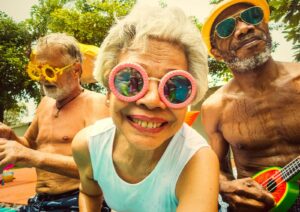Heat Stress and the Elderly: What Do You Need to Know?
The summer season is one of the most dangerous for elderly people. The hot temperatures and humidity can lead to heat stress in anyone, especially for senior citizens. Learn more here today about how to keep your elderly loved one safe from heat stress.
Reasons the Elderly Are More Vulnerable to Heat

There are many reasons why the elderly are more vulnerable to heat and heat stress. Some of these reasons include the following:
- The elderly don’t adjust very well to quick temperature changes like younger people do.
- Many elderly people have chronic medical conditions that make their bodies less able to handle the heat.
- Elderly people are often taking medications that impair their ability to regulate temperature or sweat.
These are some of the many reasons why your elderly loved one might be more prone to getting heat stress.
Types of Heat Stress
There are also different kinds of heat stress that you should watch out for in your elderly loved one. These include the following:
Heatstroke. This is very severe. It happens when one’s body can’t control its own temperature. The temperature of the body increases quickly. The body is not able to produce sweat or cool down. In just 10-15 minutes, the body can get to 106 degrees Fahrenheit. Heatstroke can lead to permanent disability or death if emergency treatments aren’t received immediately. If your elderly loved one has heatstroke, their skin might be dry, hot, and red. Their pulse would be strong and rapid. A throbbing headache, nausea, and dizziness might be present, too.
Heat exhaustion. This is a milder type of heat stress. It can happen days after being exposed to hot temperatures. If your elderly loved one is looking pale, sweating heavily, having muscle cramps, overly tired, weak, dizzy, has a headache, nauseous, or vomiting, they could have heat exhaustion. They might also faint, have moist or cool skin, have a weak or fast pulse, or have shallow or fast breathing.
These are some of the types of heat stress that your elderly loved one could face. Knowing the symptoms of heat stress of any kind could help your loved one to get the appropriate treatment in time.
Protecting Your Loved One from Heat Stress
There are some ways that you can help to prevent your elderly loved one from getting heat stress. Some of these tips include the following:
- Be sure they are drinking enough cool, hydrating drinks (non-alcoholic)
- Rest when needed
- Take a cool bath or shower after being in the heat
- Get into an air-conditioned or fanned area as soon as possible after being in the heat
- Wear lighter clothing
- Stay indoors if it is very hot out
- Don’t do intense activities when it is hot out
- Get an elderly care provider to help keep an eye out for your loved one
- Visit your loved one often when it is hot to see if they need anything
If you do these things, you can help to prevent heat stress in your elderly loved one.
If at any time, you suspect your elderly loved one has heat stress, you should get them cooked down and get them medical care as soon as you can.
Source: https://www.cdc.gov/disasters/extremeheat/older-adults-heat.html
If you or an aging loved-one are considering Elderly Care Services in the Olathe KS area, please contact the caring staff at Elder Care of Kansas City, today. Proudly serving Jackson, Clay, Platte and Cass Counties in Missouri as well as Johnson and Wyandotte Counties in Kansas for over 30 years. Call us at 816-333-3322.
- Smart Ways To Make Showering Safer For A Senior Parent - May 16, 2025
- What Types of Situations Lead to Personality Changes in Seniors? - May 6, 2025
- Helping Seniors Overcome Insomnia - April 21, 2025
